Understanding the Changing Health Needs of Mature, Senior, and Geriatric Cats
If you have lived with your cat since they were young, you have a good understanding of what is normal for your cat in terms of their behavior and daily habits. Any changes in their behavior or patterns can be a sign of illness. Because symptoms of disease in cats can be so subtle, even the most astute owner may miss some of these changes, especially when the onset is so gradual. For this reason, it is imperative to bring your cat to your veterinarian annually until 8 years of age and then semi-annually after 8.
During the visit with Dr. Lacie and our staff, you will review habits and behavior that may signal health changes. This review will prompt you to think about what is going on with your cat and have a different perspective, which may help identify signs of illness. Also, Dr. Lacie will perform a thorough physical exam, which will play a significant role in determining where your cat is in the aging process and what to do to keep them as healthy as possible for as long as possible.
A focus of senior cat veterinary appointments is to identify illnesses that may be in an early stage and set up a plan for treatment and management of any symptoms that may be causing discomfort. There are many illnesses that can be managed with diet, and sometimes medications may significantly improve the wellbeing of your cat. It is through the partnership of the cat owner and veterinary team that we can best address and manage senior cat issues for the best outcome.
AAFP - Senior Cats Have Special Needs
What Are Some Specific Age-Related Issues for Senior Cats?
Senior cat care is defined by life stage guidelines. However, it’s important to remember that these are just guidelines; some of our cats get older sooner, and some of them get older later. So these life stage guidelines need to be considered on a case by case basis. It's an individual consideration that you and your veterinarian will determine together but, typically, the ages and life stages are:
- Senior - 10 to 14
- Super Senior - 15+
And as cats start to age, there are some unique things that you're going to start to need to think about, including behavior changes, nutritional changes, specific veterinary medical changes that'll need to be addressed, and home environment changes. By looking at senior and geriatrics cats from an overarching view like this, you can address all of these categories and help them enter their golden years as healthy and pain-free as possible.
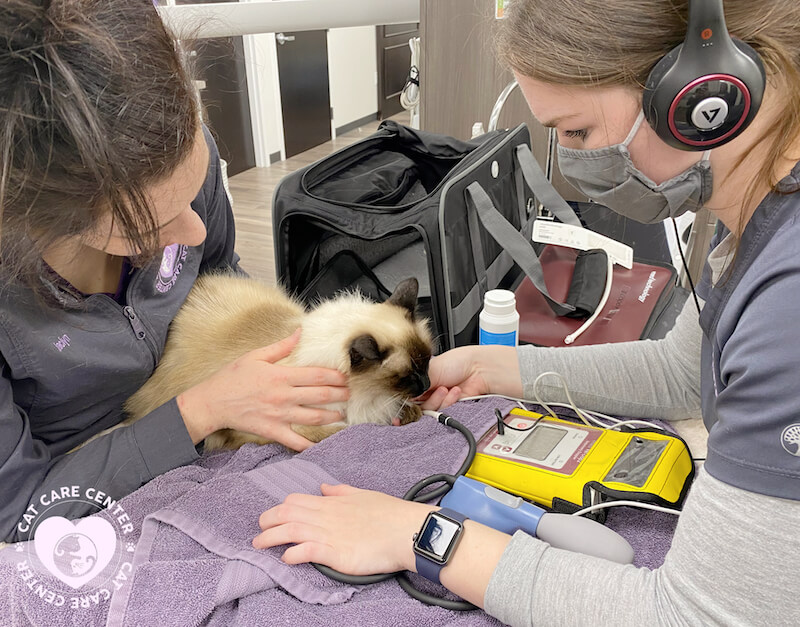
Changes in the cat's body that are common as a cat ages include:
- Altered sleep-wake cycle
- Changes in thyroid function
- A decrease in kidney function
- Changes in vision
- Decreased sense of smell
- Brittle or ingrown nails
- Heart or circulatory problems
- Decreased digestion and ability to absorb nutrients
- Reduced ability to handle stress
- Changes in mobility/arthritis (AAFP - Degenerative Joint Disease)
- Check out the osteoarthritis senior checklist here!
What kinds of preventative care can help extend the life and health of my cat?
Establishing a good relationship with your veterinarian and veterinary practice is essential in preventing disease in cats. My Cat Care Center staff is extremely valuable to me. These guys know your cats, and they know your cats so well that they are going to pick up on when something is not quite right. They also learn their blood works and what your cat needs on a biannual or annual basis. This relationship between you, your veterinary staff, and the doctor and you is so critical, and that's something that needs to be established early on—not necessarily when they turn 10 or 11.
When your veterinarian makes recommendations and they have valid reasons that they go over with you, let them do the blood work, the urinalysis, and take the blood pressure. We start that early on at Cat Care Center, and we do that for two reasons. Number one, that's where we're going to determine the normals for your cat. Number two, we're going to get your cat used to being handled in a feline-friendly way. We also make sure we handle cats extra carefully as they age. By all means, establish a bond and a preventative maintenance package with your veterinarian.
What is My Role as the Caretaker of an Elderly Cat?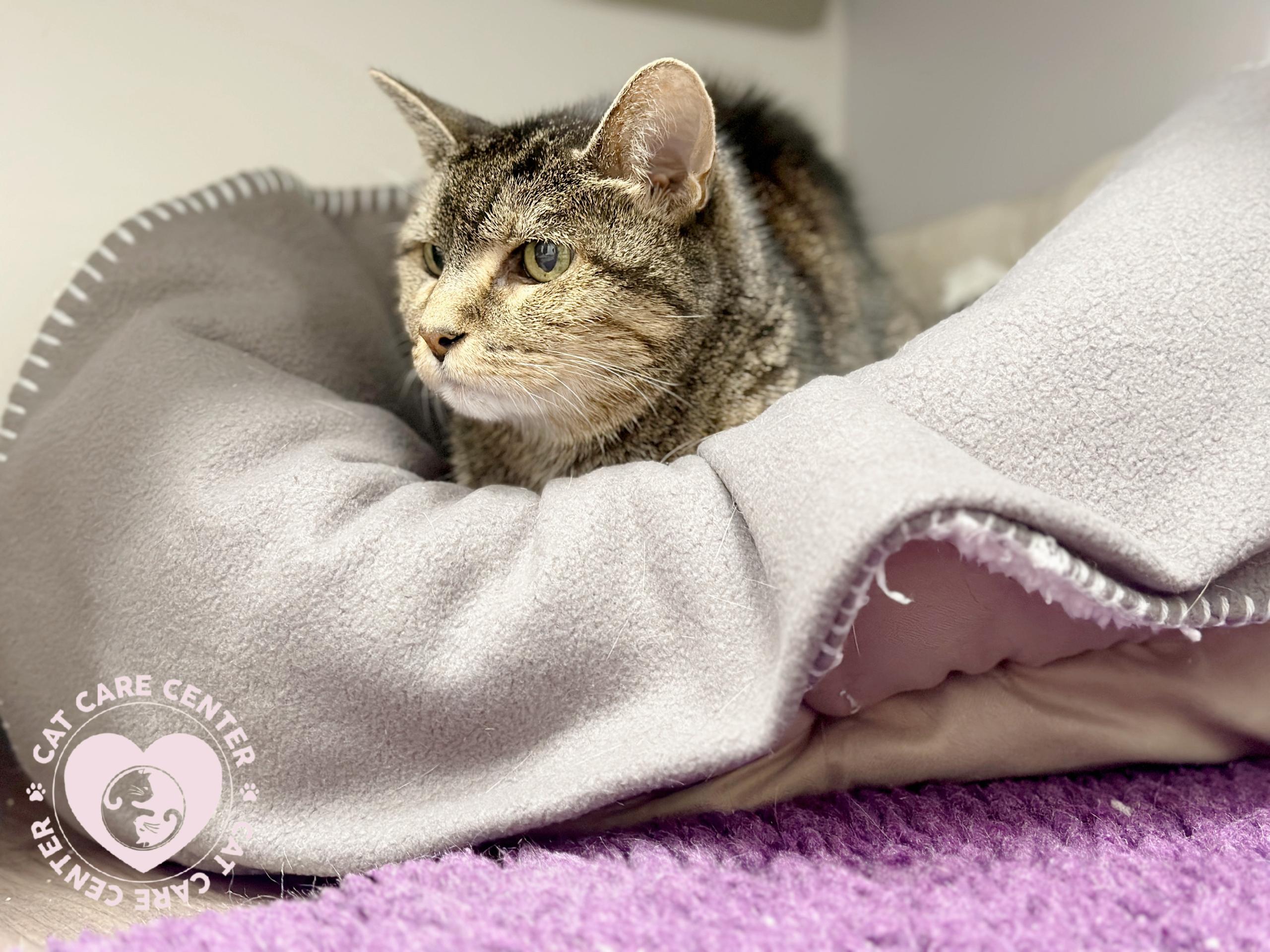
The most important role when caring for your elderly cat is being aware of their behavior and habits. Their needs may change subtly over the years, but they still require cat care basics, including social interaction and an enriched environment. While older cats may sleep more, they still need play and a stimulating environment to keep their bodies active and their minds engaged. Cats of all ages need a stimulating environment to stay healthy. Especially for indoor cats, the need for engagement is very important. All cats need to hunt and play and interact.
In addition to a stimulating environment, owners of elderly cats can expect to be responsible for things like:
- Make sure sleeping and eating areas are easily accessible
- Adjust physically challenging areas for easy access
- More frequent veterinary visits
- Dispensing medication
- Lifestyle accommodations
Understanding your expanded role in the life of your elderly cat is essential to helping them age gracefully. At your next appointment, Dr. Lacie and our staff would be happy to give you some insight and guidance on how to ensure your cat enjoys a smooth transition into their elderly years.
What Should I Know About Wellness Visits for Senior Cats?
The Feline Veterinary Medical Association recommends that a veterinarian sees senior cats every six months. Because cats age faster than people, that means almost two kitty years will pass between visits. It is important to monitor elderly cats in between visits because cats are very good at hiding symptoms of disease or illness. As cats age, illnesses become increasingly common. Therefore, it is reasonable to expect that mature cats, senior cats, and geriatric cats will likely begin to develop one or more conditions that will significantly affect their quality of life.
A typical wellness visit for senior cats includes checking:
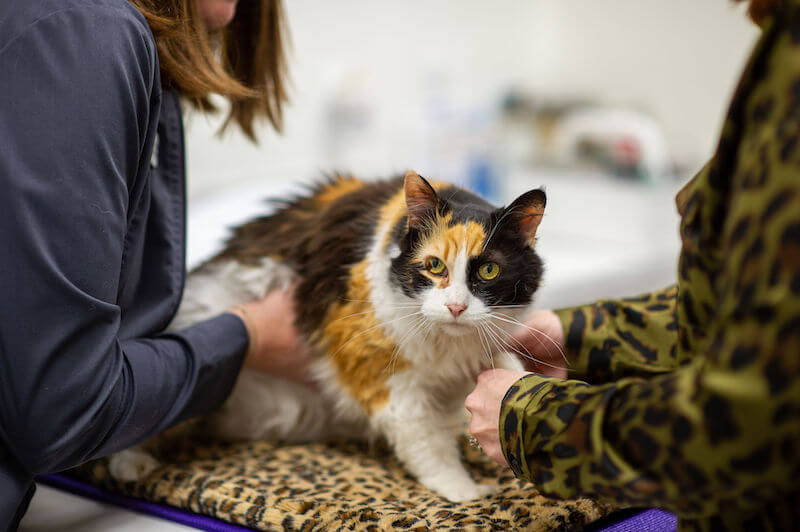
- A thorough review of habits and behaviors
- Weight and body condition
- Skin and coat quality
- Mouth, gums, and teeth
- Ears and eyes
- Thyroid gland palpation
- Heart and circulatory system
- Lungs and nose
- Abdomen
- Joints and muscles
- Blood pressure check
- Bloodwork and urine testing
- Any condition changes since the last visit
Here at Cat Care Center, we usually recommend what's called senior wellness blood work. That is a full chemistry panel that includes—all the kidney values, SDMA, and liver values. We do a CBC. Sometimes we do a PCV because, when cats are nervous, their blood clots a little bit. We always double-check everything that we're doing here. Getting their blood pressure and a urinalysis are also important. The urinalysis is particularly crucial because we're trying to detect kidney disease early on. We always do everything as feline friendly as we can.
We also will recheck our feline leukemia FIV status at different life stages, because, with the new 2020 guidelines, some of those viruses have changed, and it's important that we keep up to date with that. We monitor fecal and, other than that, we just do a good exam. There's just nothing that can take the place of a great exam, and knowledge of that client.
Additionally, wellness visits for senior cats can also include vaccinations, parasite prevention, and treatment for any specific conditions that your senior cat may be developing.
What is Considered Senior Cat Food?
Feline nutrition is essential throughout the entirety of a cat's life. However, it is an incredibly important facet of senior cat care.
Feeding a mature, senior, or geriatric cat an age-specific diet can help:
- Manage weight
- Increase lifespan
- Maintain healthy skin, coat, and bodily functions
Senior cat food is formulated specifically for the nutritional requirements of aging cats. Serve it in dry or wet (preferably wet) form. Because aging cats require increased daily water intake, serving canned food and/or leaving multiple water dishes around the house is always a good idea when possible. Feeding small, frequent meals 3-4 times a day will help senior cats digest food easier than serving fewer, larger meals.
How do a cat's nutritional needs change as they age?
One of the things that happens as cats age is that they don't absorb their food as well, and they also can't tolerate large meals. We forget about the free radical damage that we experience on a daily basis, well, they do too. In other words, they’re mentally aging as well. Senior or geriatric cats don't often remember where the food bowl is, so some of them will overeat just to overeat. They’ll start to vomit, as they don't absorb it as well.
You need to change the nutritional content because older cats are going to need a little bit more protein, which is an interesting point in feline medicine right now, and there's a lot of research out there. It used to be said that, as the kidneys slowed down, maybe we should restrict their protein. There are now a lot of questions about that, as one of the aspects of aging is muscle loss, and cats are obligate carnivores, so they need protein.
So there's a balance that needs to be found, and this is often needed with specific calculations from your veterinarian. Feeding small meals throughout the day, often incorporating canned food if your cat will tolerate that, is a great way to strike that balance. And sometimes they need an easily digestible diet for their nutritional needs because their digestive system is not working the same as it did when they were younger.
What is Involved in Dental Care For Senior Cats?
As cats enter their senior years, those who have addressed dental care with regular dental checkups throughout their life have a significant advantage over cats who have ignored their dental issues. Regardless of whether dental care has been a mainstay of your cat's preventative program, it will be vital as they age. Dental disease is a gradual but painful degenerative condition. Living with chronic pain is very stressful and will significantly impact your cat's wellbeing. Of course, your cat won't let you know that they are in pain, however.
The fact is that almost all cats over three years of age have some level of oral health issues, and these conditions do cause significant pain. Early onset dental recommended prophylaxis by your veterinarian is a great way to do everything you possibly can to slow down dental disease. If your cat has not had a dental checkup in over a year, they are due. Schedule an appointment today.
How Does My Veterinarian Manage Disease In Elderly Cats?
As your cat ages, they become more susceptible to the myriad of diseases commonly found to plague elderly cats.
Some of the more common diseases that cat might experience as they age include:
- Kidney Disease
- Diabetes
- Thyroid Disease
- Hypertension
- Gastrointestinal Issues
- Arthritis
- Cancer
- Memory/Comprehension Challenges
Of the four big categories that I see here at Cat Care Center, chronic kidney disease is a big one. Number two is hyperthyroidism. It is the most common endocrine disease that we do see in a cat, and I think the rate in cats is somewhere around 11%. The next one is diabetes. That's another important one, especially for some cats that have been heavy. Males are more predisposed than females, but that's not always the case. And then the fourth is GI disease, whether it’s inflammatory bowel disease, allergies that develop, or even cancer, and also have to look out for GI lymphomas and some of these other cancers.
Life stage preventative management is very important to us here at Cat Care Center, which means having various blood works done at the different life stages, year to year along the way.
Managing disease, whether this means preventing or treating one or more at a time, requires a knowledge of the ailment, and also spotting symptoms and changes in elderly cats before they become full-blown emergencies.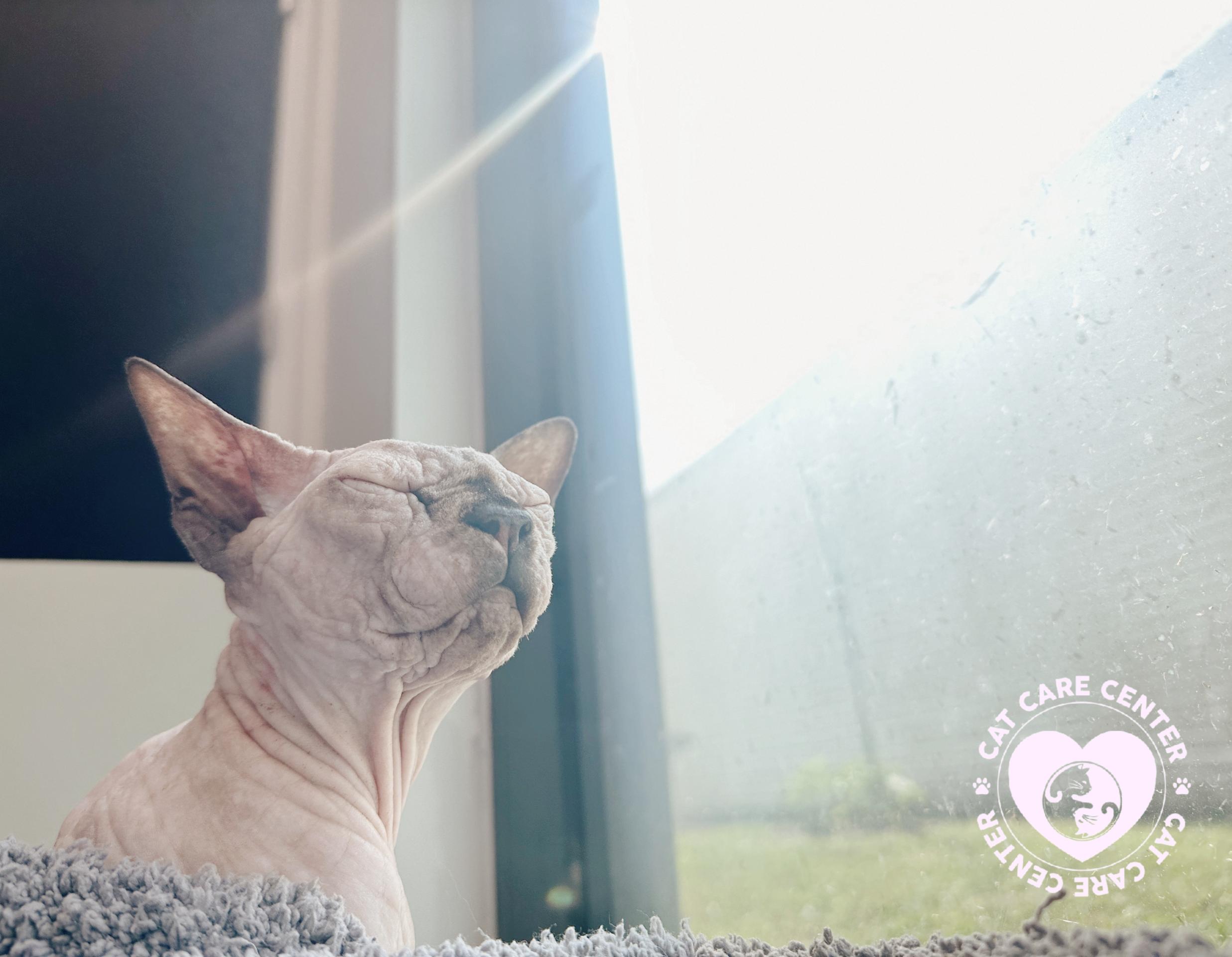
It’s essential to monitor your cat's behavior and routine and note any changes, including:
- Weight Loss
- Change in Thirst and Urination
- Diarrhea
- Vomiting
- Appetite Changes
- Litter Box Habits
- Lethargy
- Any Behavioral Changes
When my patients reach that senior category around that 10-year age range, I ask them to come in twice a year. They don't have to do blood work every year, and they're not necessarily getting vaccinations every year, but we're at least putting our hands on them and repeating blood work that's showing patterns.
If you witness or suspect any changes in behavior or routine for your mature, senior, or geriatric cat, we recommend making an appointment at Cat Care Center immediately.
What are some signs and symptoms that my cat may be slowing down?
One sign of a cat slowing down is sleeping more, which can be a tricky thing to look for, as we all know that cats sleep a lot, especially when we're not home. But you’ll want to watch for a change in their sleeping patterns. Perhaps they're awake more in the evening than they used to be over the last several years, or they're waking up in the middle of the night. One of the most common things that I hear in my practice is people are listening to their cats howl. That's a very important thing to discuss with your veterinarian because there are several causes of that.
The second thing to watch for is the hesitation to jump up and/or jump down because we know from research that 92% of cats above the age of 10 have arthritis. Sadly, the number one sign of pain in a cat that I experience here at Cat Care Center is no obvious sign at all. That’s scary when you think about that because one of the things we want as pet owners is to love them and we want them to be comfortable. So watch signs of jumping changes, behavior changes, sleep/wake patterns, and eating changes. All of those things are considerations when discussing with your veterinarian if your cat is potentially aging and does need some changes that they might be able to help you with.
What is the most important thing to know about caring for a senior cat?
The most important thing is, congratulations, because for them to be with you into their senior years is really special. That means they've been with you through some of life's biggest challenges, they've been with you through maybe marriages, kids, et cetera, so you have a special bond there. So number one, acknowledge that bond, and remember that when they get older, things change with them. Their behavior changes—they could be less needy or more needy. Give them the time that they need. Also, make sure you have a good established veterinarian that's with you every step of the way, to help you think about the things that you may not be thinking about.
As someone that has a 20 year old Persian who I love dearly, Millie, I just thank God every single day that I have this beautiful cat that has been with me through every child I've had, through my marriage, through veterinary school, through moving, and I'm so grateful for that bond. So I think the most important aspect is loving them, taking care of them as best as you can. Every day is a gift. Having a good veterinary care staff that's going to think about arthritis, pain, dental disease, diet, nutrition, and behavioral changes is essential.
Here at Cat Care Center, I have a senior cat checklist, and I go through things that change. We talk about everything in your home that may need to change—from the way you feed them and how their litter box is managed to how you handle their sleep/wake patterns. It takes a village when it comes to senior cat care, we all know that.
What Are the Considerations For Quality of Life for Senior And Geriatric Cats?
Partnering with your veterinarian is the best way to enjoy your cat's senior years and allow your cat to age gracefully and comfortably. During your regular visits, quality of life issues will be addressed. Along the way, you will make health decisions for your cat with the help and guidance of Dr. Lacie. At some point, you may be confronted with serious health issues and may need to address the need for diagnostic testing and possibly procedures for your geriatric cat.
Some important health assessment questions you and your vet will review regarding senior cat quality of life include: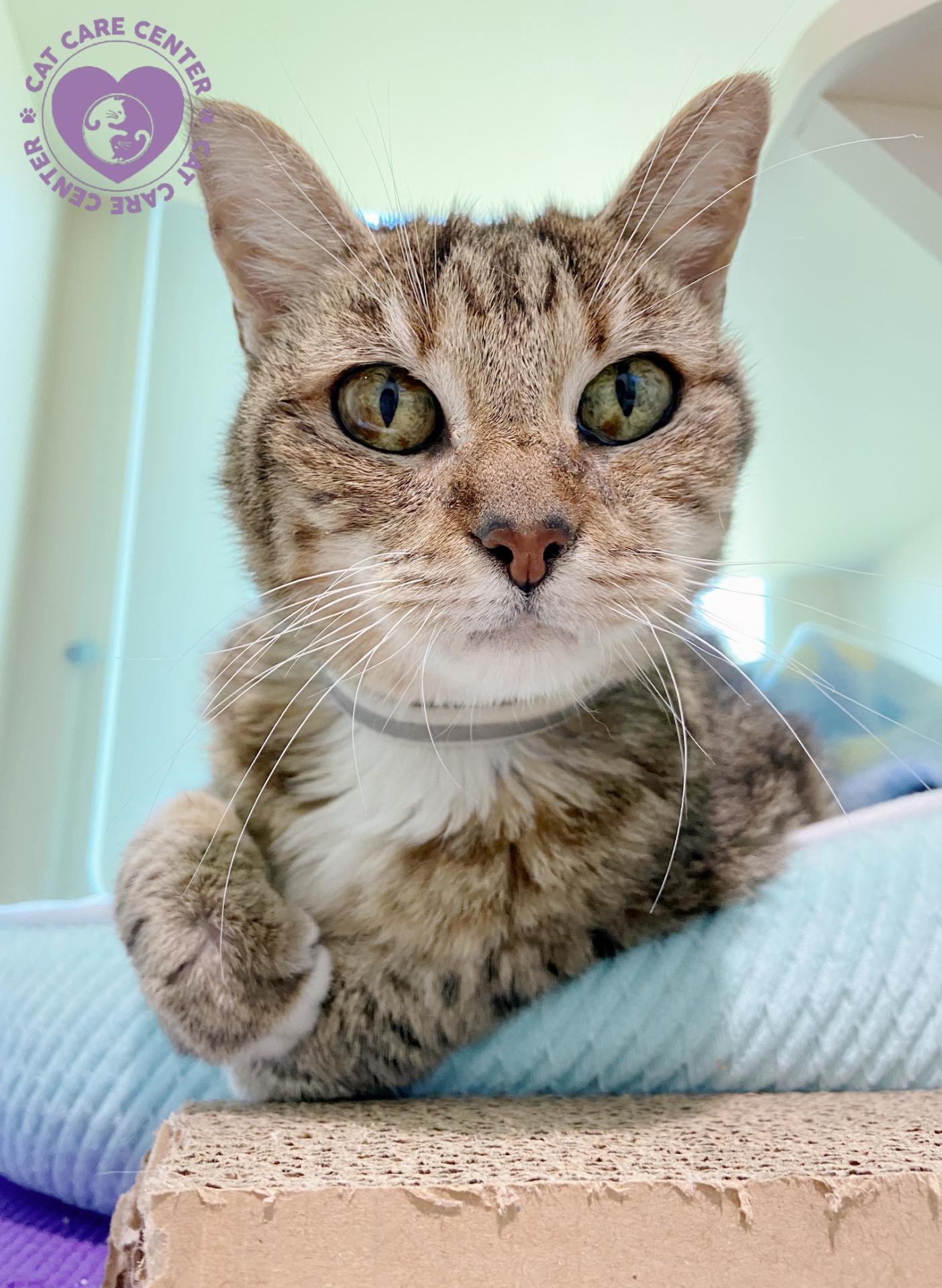
- Is your cat experiencing any pain and, if so, is the pain well managed?
- Is your cat's appetite normal and are they able to eat normally?
- Is your cat interacting with other pets and family members as usual?
- Does your cat have more good days than bad days?
- Does your cat follow predictable routines for sleeping, resting, grooming, eating, playing, and socializing?
If you are having trouble discerning the answers to any of these questions, Dr. Lacie is here to help.
What Are the End of Life Decisions I Need to Know About For My Cat?
Partnering with Dr. Lacie through your cat's senior years will make the final decisions more gradual and gentle. End of life decisions are always difficult, but when you feel supported by our veterinary team, you will feel more comfortable with and accepting of your choices.
At Cat Care Center of Baton Rouge, our compassionate and supportive veterinary team is here to help you in any way that is in the best interests of you and your feline companion. We understand this is a very difficult time regardless of the situation. You have lived with your cat for a long time, you have a strong bond with your cat, and the grief process is real and should be taken seriously. Please contact us for information about end-of-life services including grief support.
At Cat Care Center of Baton Rouge, We Are Here for Your Aging Cat
We are here to help our furry feline patients age gracefully, peacefully, and comfortably by offering comprehensive senior cat care services. Aging cats rely on the love and care of owners and good veterinary support staff as they grow into their golden years. We have helped better the lives of thousands of aging cats while bringing peace and happiness to their human caretakers. If you still have other questions and you'd like to reach out to us, call us directly at (225) 228-1039.
